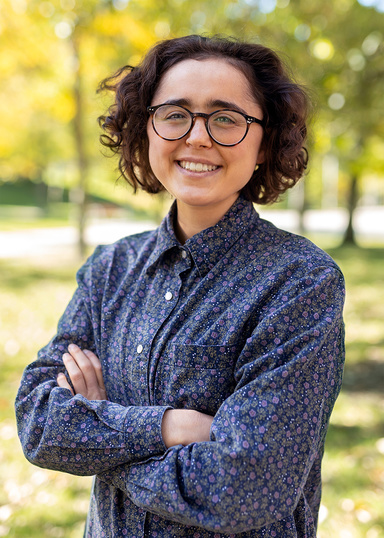Hannah Zadeh, a first-year PhD student in the University of Iowa’s Sociology and Criminology department, is already challenging people to rethink medical research’s presumed impartiality. “I think we sometimes look at medical research and data as a sort of impenetrable black box,” they explained, “and certainly it is very valuable, but it’s also important I think to come at it in a lot of different ways critically.” For Zadeh, that means delving into the biases behind seemingly objective clinical algorithms, especially as they relate to race.

Motivated in part by contradictions between how race was discussed in their sociology classes versus their pre-med classes, Zadeh set out to explore how “in medical research, it seemed like the race variable was being used inconsistently.” For their undergraduate thesis at the University of Iowa, they investigated a clinical algorithm called the estimate glomerular filtration rate (eGFR), which provides information about kidney function and can help determine how well a patient’s kidneys are filtering their blood. Interestingly, the algorithm “spits out different numbers based on whether or not the provider judges a patient to be African American,” even if all other medical information remains unchanged. In other words, at least for eGFR, the race variable plays a significant role in drawing conclusions about a patient’s medical information.
More broadly, Zadeh wants to understand what happens when medical researchers run models using race as a variable. “What’s important is how you define what race is and when you decide that it’s important to put that in your model,” they explained—and by extension, what it means when medical researchers try to identify or track racial health disparities.
As they move forward in graduate school, Zadeh hopes to research the intersection of algorithms and healthcare systems and delivery. In a broad sense, they want study medical research terminology and its associated presumptions. “One of the things I’m really interested in is even this word ‘algorithm’ that we hear everywhere nowadays,” they said. “I’ve gotten to the point in my research where I feel like I don’t even know what it means anymore because it’s attributed to so many things.” They intend to contribute to existing scholarship that demystifies and critically engages with algorithms, or as they phrase it, to “open up the black box” of these algorithms and in doing so, better understand their functions. Through this, they plan to contribute to research about technological advances in healthcare systems through the lenses of race and racism.
As their mentor, Dr. Louise Seamster, can attest, Zadeh is already making a big impact. "I have been honored with the opportunity to learn from Hannah for the past few years," said Dr. Seamster. "Their work has been truly exceptional in each project we've worked on since 2020: from assembling and cleaning a big-data database (with no computer science training), to their thesis developing a new genealogical method for analyzing the evolution of ideas, to a theoretical paper on racial proxies and algorithms, to the new project ideas they bring to every advising meeting. On top of all these talents, Hannah has a unique ability to sort through big-picture implications, trends and shifts, and a strong ethical commitment to work on projects with obvious real-world stakes for alleviating inequality, especially projects connected to Hannah's pre-med training."
Zadeh has delivered presentations at the University of Iowa Hospitals & Clinics, but other organizations are also taking note. Working with Graduate Careers and Fellowships Advisor Brady Krien in the Graduate Success Center, they prepared an application for the highly competitive National Science Foundation Graduate Research Fellows Program (NSF GRFP). They received the award, and with it, a five-year fellowship with three years of financial support. The financial support will offer significant benefits to Zadeh in “the privilege of protected time to focus on research” without the added pressures of an assistantship.